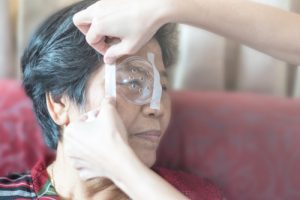June is Cataract Awareness Month. The doctors at Minnesota Eye Consultants want to join the American Academy of Ophthalmology in raising awareness about cataracts this month.
We know that many of you have special questions and concerns about having cataract surgery during the COVID-19 pandemic. Some of you may have postponed a scheduled cataract surgery in the last few months or others may have noticed bothersome changes to your vision that could be the signs of a cataract.
Only an eye specialist can determine whether you have a cataract or another type of vision problem. Please know that it is perfectly safe to schedule your eye exam or cataract surgery evaluation at Minnesota Eye Consultants. We are taking extraordinary safeguards to protect you from contracting COVID-19.
Keep reading to learn more about cataracts and why Cataract Awareness Month is important!
Is This the Right Time to Have Cataract Surgery?
Most ophthalmologists recommend cataract surgery when patients feel that a cataract is interfering with their job, driving, or quality of life. There have been many advances in cataract care over the years.
Minnesota Eye Consultants offers laser-based cataract surgery as an option for patients. Laser cataract surgery makes it easier to break up the eye’s natural lens and remove it before replacing it with an artificial lens or IOL.
If you are worried about having eye surgery during the pandemic, rest assured that it is extremely safe! The Minnesota Eye team is taking every possible precaution to protect you before, during, and after surgery.
Our eye surgery centers have always maintained the highest standards for infection control and continue to evolve our processes as new COVID-19 recommendations are published. Now we have added new measures that are recommended by the CDC and Minnesota public health officials.

All patients and staff will have their temperatures taken when entering the building. We have established social distancing measures during the registration and waiting process.
Our surgical staff is wearing appropriate protective equipment, including surgical grade masks and goggles. The pre- and post-op areas and the surgical suite are thoroughly cleaned and disinfected between patients. All patients are asked to wear a mask and kept at a safe distance from one another.
These precautions ensure that you will be as safe as possible when you undergo cataract surgery at Minnesota Eye Consultants.
How Do You Know If You Have a Cataract?
Before you have cataract surgery, you first need to know that you have cataracts. Only an eye care specialist is qualified to diagnose you with cataracts, which is why regular eye exams are so important. Many patients with cataracts describe having them like looking at the world through a foggy window. Common symptoms of cataracts include the following:
● Trouble driving at night
● Bright glare from headlights or sunlight
● Halos around headlights
● Difficulty reading
● Colors seem faded
● Double vision
● Blurry vision

Cataracts often progress very slowly. Many people have early-stage cataracts for years before they need surgery. It’s important to take care of yourself in the early stages of cataracts.
How To Take Care of Yourself if You Have Early-Stage Cataracts
If you know that you have early-stage cataracts, taking care of yourself is key. Make sure that your eyes are as healthy as possible. If you do notice that anything seems off, like your vision has changed, see your eye doctor.
We recommend the following tips:
● Have a comprehensive eye examination with dilating drops every year if you are over the age of 65. If you are under the age of 65, you should have one every two years to monitor any cataract progression.
● Wear good quality sunglasses with 100% UV protection to protect the eyes. Avoiding damaging UV rays may actually slow down the growth of the cataract.
● If you are having trouble reading, use brighter lights and a magnifier.
● Make sure you have an updated prescription for your glasses or contacts to ensure safety, especially when driving. If you ever feel unsafe while driving, it’s time to get off the road. Find a friend or family member that can drive you around instead. This is the safest option until you can have your cataracts removed!
● Quit smoking.
● If you have diabetes, keep your A1C and blood pressure under control and at healthy levels.
Questions to Ask Your Eye Surgeon About Cataract Surgery

We recommend that you bring a list of your questions and concerns to your cataract surgery evaluation. Here are some suggested questions that you may want to ask:
● Is there anything that I need to do to prepare for surgery? What about taking my normal medications?
● What is a typical recovery after cataract surgery?
● When will I be able to drive again?
● When can I exercise?
● Will I still need glasses after my cataract surgery?
● How will I manage my glasses if I am going to have surgery on the other eye soon?
● What is the difference between monofocal lenses and premium lenses?
● What is the difference between standard cataract surgery and laser-assisted cataract surgery? Which one do you recommend for me?
● Will my insurance cover cataract surgery?
● What are the costs if I choose to have premium lenses?
What are the possible side effects or complications of the surgery?
Before any procedure at Minnesota Eye Consultants, it’s important to feel as comfortable as possible. Having questions about cataract surgery answered before undergoing the procedure ensures that you know what to expect from start to finish.
What Happens During Cataract Surgery?
Cataract surgery is a quick outpatient surgery. There are some pre-operative procedures, but the actual surgery is amazingly fast! It usually takes less than a half-hour to complete.
When you arrive at the eye surgery center, the staff will wash and clean the area around your eyes. Drops are then inserted to dilate your pupils.
After dilating your pupils, anesthetic eye drops will numb the eye. Most patients are awake and feel no pain during the procedure. You may be given medication to help you relax if you are anxious before the procedure begins.

Your Minnesota Eye surgeon will enter the eye through tiny incisions made with a laser or blade near the edge of the cornea. The next step is to remove the clouded natural lens from your eye and replace it with the artificial intraocular lens (IOL). Usually, no stitches are necessary, and the tiny incisions close by themselves.
What Happens After Surgery?

You will recover briefly at the center before receiving your discharge instructions. Our staff will cover your eye to protect it for at least 24 hours.
You will need to insert prescription eye drops at regular intervals for several weeks to heal the eye and prevent infection. Most patients return for a postoperative visit on the day after surgery.
It’s especially important to follow the post-operative instructions that you are given. Finally, you must arrange for someone to drive you home after surgery as you can’t drive yourself home.
Think that you may need cataract surgery? Schedule your cataract screening at Minnesota Eye Consultants in Minneapolis, MN today! We look forward to seeing you for a cataract evaluation soon!









